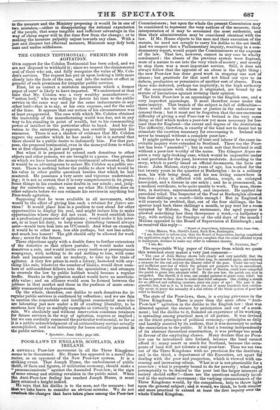THE COBDEN TESTIMONIAL : PREMIUMS FOR AGITATION.
OUR support for the Cobden Testimonial has been asked, and we are not disposed to withhold it; since we respect the disinterested zeal of those who ask, and fully recognize the value of Mr. Cob- den's services. The request has put us upon looking a little more closely into the facts of the case, and into the nature or effect in general of such premiums for irregular public services.
First, let us correct a mistaken impression which a former paper of ours* is likely to have imparted. We understood at that time that Mr. Cobden was a very wealthy manufacturer—a "cotton lord," who was willing to devote his time to the public service in the same way and for the same inducements as any .other lord—that is to say, at his own expense, and for the sake of the fame. It appears that our notion of his circumstances was at least exaggerated. The ease with which Mr. Cobden obtained the leadership of the manufacturing world was due, not in any way to his standing in point of wealth, but to his commanding power of intellect in the particular affair in hand. And his de- votion to the enterprise, it appears, has sensibly impaired his resources. There is not a shadow of evidence that Mr. Cobden regrets the sacrifice which he has made ; but it is natural that there should be a public desire to indemnify him. For that pur- pose, the proposed testimonial, even in the moneyed form to which we at first objected, is just and proper. But when it is proposed to extend such donatives to other ubjects and other persons, we are brought to a pause. One ground on which we have heard the money-testimonial advocated is, that it would be so advantageous to secure Mr. Cobden as a public ser- vant. There is nothing before the public to show what would be his value in other public questions besides that which he had mastered. He possesses a very acute and vigorous understand- ing ; it is not so certain that it is very comprehensive in its grasp. Some things in his conduct raise doubts in our minds ; and, judg- ing for ourselves only, we must see what Mr. Cobden does on other subjects before we can estimate his services in anything but Free-trade agitation. Supposing that he were available in all movements, what
would be the effect of giving him such a retainer for future ser- vices ? It would place him in a position to cast about for other opportunities to display his zeal, and might induce him to make opportunities where they did not exist. It would establish him as a professional promoter of agitations ; would make it his inter- est, or at least his duty, to keep some disturbing turmoil always astir—would turn him into an O'Connell. And what an example it would be to other men, less able perhaps, but not less active, and much less honest! The gift should only be allowed for work done ; never for the future.
These objections apply with a double force to further extensions
of the donative so that others partake. It would make such donatives a rule, and would invite every restless or presumptuous scapegrace, with nothing to do and nothing to lose, with some dash and impudence and no modesty, to take up the trade of agitator. A very few prizes in such a lottery, bestowed with any- thing like rule, whatever the number of blanks, would draw num- bers of self-confident fellows into the speculation ; and attempts to overrule the law by public hubbub would become a regular traffic. Stocks in the agitation market would have an ascertain- able value ; and an alliance would soon be formed between the jobbers in that market and those in the purlieus of more osten- sibly commercial exchange-rooms.
On the whole, therefore, our dislike to such donatives for ir-
regular public services is confirmed by reflection ; and we are fain to caution the respectable and intelligent commercial men who are labouring just now under a fit of exulting liberality, to be cautious how they so multiply examples as virtually to establish a rule. We absolutely and without reservation condemn retainers for future services in the way of agitation, express or implied ; but we can cordially commend the particular testimonial, so far as it is a public acknowledgment of an extraordinary service actually accomplished, and is an indemnity for losses actually incurred in the public service.
Spectator, Jane 18th; page 566.


























 Previous page
Previous page